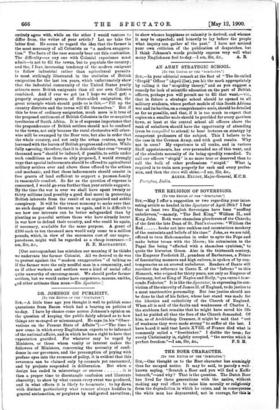THE RELIGION OF SOVEREIGNS.
[To TEE EDITOR OF TIM " SPECTATOR."] SIR,—May I offer a suggestion or two regarding your inter- eating article so headed in the Spectator of April 28th ? I fear that at least two English Sovereigns have been "scoffing unbelievers,"—namely, "The Red Sing," William IL, and King John. Both were shameless plunderers of the Church; of the first the late Dean of St. Paul's observes: "William the Red broke out into reckless and ostentatious mockery of the restraints and beliefs of his time." John, as we are told, offered to turn Mahommedan in order to spite the Pope and make better terms with the Moors ; his submission to the Papal See being "effected with a shameless cynicism," to quote the historian Green. Also in the thirteenth century, the Emperor Frederick II., grandson of Barbarossa, a Prince of fascinating manners and high culture, is spoken of by con- temporaries as an avowed unbeliever. Readers of Dante will recollect the reference in Canto X. of the "Inferno " to this Monarch, who reigned for thirty years, not only as Emperor of Germany, but as King of Naples and Sicily, "qua entro a lo se- condo Federico." It is like the Spectator, in expressing its con- viction of the sincerity of James II. of England, to do justice to a most unattractive personality. But less justice should not be done to that of his father, whose last stand was made for the liberties and catholicity of the Church of England. When all is said of the faults and weaknesses of Charles I., the stubborn fact remains that he might have saved his life had he yielded all that the foes of the Church demanded. Of him, as of Archbishop Cranmer, it might be said that " out of weakness they were made strong " to suffer at the last. I have heard it said that Louis XVIII. of France died what is commonly called a "freethinker." I dislike the term; for surely Christianity is, rightly accepted, "the service which is
perfect freedom."—I am, Sir, &c., F. S. H.






































 Previous page
Previous page